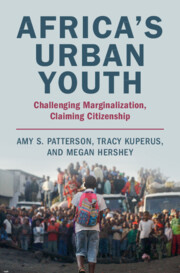Book contents
- Africa’s Urban Youth
- Africa’s Urban Youth
- Copyright page
- Dedication
- Contents
- Figures
- Tables
- Acknowledgments
- Abbreviations
- Introduction
- 1 Theorizing Urban Youth and Everyday Citizenship
- 2 Manifesting Citizenship through Local and Distinct Actions
- 3 Engaging the State
- 4 Confronting Economic Marginalization
- 5 Contesting Citizenship through Religious Identity
- 6 Affirming and Challenging Patriarchy
- 7 Channeling Frustration through Exit, Exclusion, and Engagement
- Conclusion
- Book part
- References
- Index
6 - Affirming and Challenging Patriarchy
Published online by Cambridge University Press: 10 August 2023
- Africa’s Urban Youth
- Africa’s Urban Youth
- Copyright page
- Dedication
- Contents
- Figures
- Tables
- Acknowledgments
- Abbreviations
- Introduction
- 1 Theorizing Urban Youth and Everyday Citizenship
- 2 Manifesting Citizenship through Local and Distinct Actions
- 3 Engaging the State
- 4 Confronting Economic Marginalization
- 5 Contesting Citizenship through Religious Identity
- 6 Affirming and Challenging Patriarchy
- 7 Channeling Frustration through Exit, Exclusion, and Engagement
- Conclusion
- Book part
- References
- Index
Summary
The chapter augments feminist analysis of patriarchy and women’s citizenship in Africa. Among respondents, men and women emphasize gender equality when discussing legalistic elements of citizenship, such as obeying the law. However, since much of everyday citizenship revolves around daily interactions, women’s expected roles as mothers and men’s constructed roles as protectors and providers are central to the ways that respondents view citizenship. Men and women highlight communal obligations, moral character, and building the nation when discussing citizenship, but these elements manifest differently across genders. Although Afrobarometer findings indicate more men attend local meetings, both men and women are active in local groups and stress legal obligations. Some youth push back against gendered citizenship, crafting new citizen identities rooted in lived experiences. Although surveys show fewer women than men engage in voting and protesting (except in Uganda), some respondents demonstrate micropatterns of contestation through support for women in political office. A case study of Ghanaian youth mobilizing against gender-based violence illustrates both challenges to gendered citizenship and affirmation of this identity.
- Type
- Chapter
- Information
- Africa's Urban YouthChallenging Marginalization, Claiming Citizenship, pp. 145 - 172Publisher: Cambridge University PressPrint publication year: 2023

